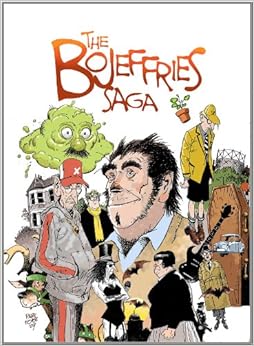What I try to do with reviews at this Bookshelf blog is keep it simple and spoiler-free, and let you know whether I'd recommend you pick up a copy of what I just read. Seems to work okay. This time, a brief review of
The Bojeffries Saga (Top Shelf, 2014).

If you'd like some evidence why some of us who love the comic medium have the greatest respect for Alan Moore, then Top Shelf has just the book for you. It's a collection of
The Bojeffries Saga, a deeply oddball little comic that he wrote and which was illustrated by the downright brilliant Steve Parkhouse. Scattered here and there in these comedy stories are some of the best, funniest, most downright clever one-two punches in the business.
Take "A Quiet Christmas with the Family," which was originally published in the anthology magazine
A1 in 1990. It looks for all the world like Moore just found a great throwaway gag for a single panel while the rest of the story chugged along. The family son gets a Christmas present which nobody would want and finds unexpected joy and pleasure in it. The ridiculous gift, and his reaction, are very funny. I've read this I-don't-know-how-many times and always got a huge smile, it's so silly. And then, two pages later, bam!, the gag gets a second, totally unexpected bonus punch line in an additional throwaway panel. Moore does this frequently - in a masterful short story called "Chronocops" that appeared in
2000 AD, he did it something like thirteen times in five pages - but he camouflages his structure so well that even when I've read a story repeatedly, I still don't see it coming and laugh like a hyena.
The Bojeffries Saga has always surprised readers who see that title and find something different. This "saga" isn't a twelve-book epic, some lost magnum opus by our man from Northampton. It's a collection of nine short stories, coming to under one hundred pages, about the misadventures of a really weird family who have lived for decades in a council estate. There's a quiet mad scientist, his two teenage kids, a werewolf uncle and a vampire uncle, a grandfather who is a violent blob of protoplasm, and a radiation-emitting baby. Their house has time and space warps scattered around the place, and none of the Bojeffries clan really has much understanding of any kind of social sense, or, as the violent and hideous Ginda demonstrates as she looks for a mate one evening, biological sense.
It's howlingly funny, every bit as clever and downright wonderful as some of Moore's other comedy series like
D.R. & Quinch and
Jack B. Quick, neither of which have particularly deep page counts either. Top Shelf's new edition reprints all of the previous stories along with a sparkling, brand new 24-page tale, the first new Bojeffries escapade in twenty years. The reproduction is flawless and it's priced just right, which is lovely since a previous edition from the early nineties regularly goes for three figures these days. If you enjoy comics, and if you enjoy laughing, then you need this book. Highly recommended.
An advance copy of this book was provided by the publisher for the purpose of review. If you'd like to see your books (typically comics or detective fiction) featured here, send me an email.






